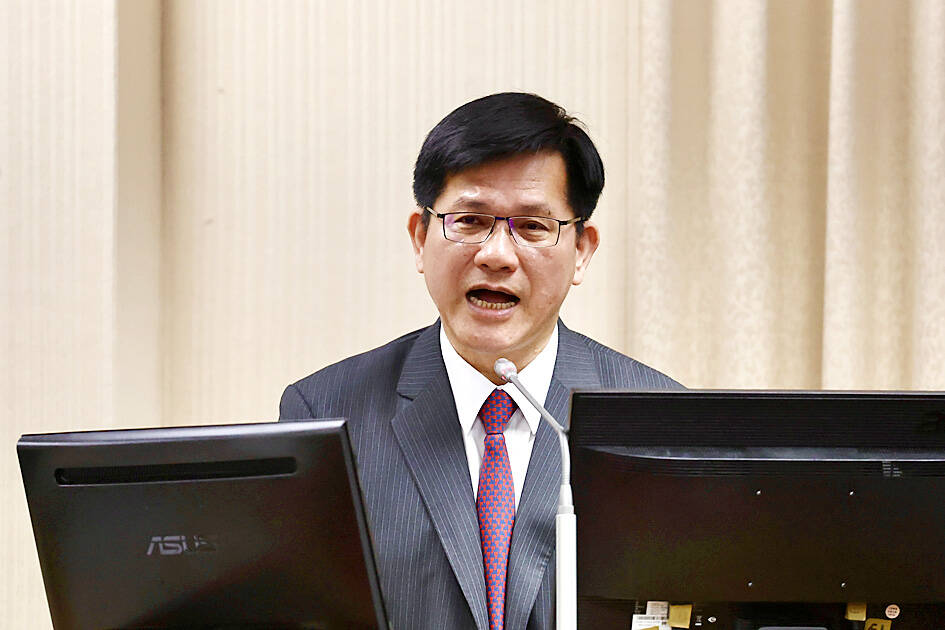Taiwan’s diplomatic efforts are facing harsh challenges, as China steps up its coercion campaign and attempts to expand authoritarianism, Minister of Foreign Affairs Lin Chia-lung (林佳龍) said yesterday, adding that Taiwan would continue to pursue “integrated diplomacy” and strive to win international support.
“Although facing a difficult international situation, with the state of geopolitics and the global supply chain constantly changing, Taiwan can use this moment as a diplomatic opportunity,” Lin said while presenting a report at a meeting of the legislature’s Foreign Affairs and National Defense Committee.
The biggest threat to Taiwan’s diplomacy is Chinese coercion, which includes increased diplomatic suppression, military intimidation and economic pressure, as it attempts to create a “new normal,” he said.

Photo: CNA
China also employs hybrid warfare tactics, including legal warfare, disinformation campaigns and “gray zone” activities, to exert pressure on Taiwan, he said, adding that Beijing continues to distort UN Resolution 2758 and on Monday last week staged military drills around Taiwan, which harmed regional peace and stability.
China, Russia, Iran and North Korea — the so-called “Axis of Upheaval” — are collaborating to challenge the rules-based international order, an aggressive authoritarianism expansion that is becoming a global challenge, Lin said.
Despite the difficult situation, the Ministry of Foreign Affairs (MOFA) continues to pursue integrated diplomacy and has achieved preliminary achievements, with more than 2,300 foreign dignitaries visiting Taiwan to show their support, since President William Lai (賴清德) took office in May, he said.
He has previously said that integrated diplomacy encompassed “values-based diplomacy, alliance diplomacy and economic diplomacy,” which tie in with Lai’s core foreign policy strategy based on “democracy, peace and prosperity.”
The integrated diplomacy approach also involves deepening ties with diplomatic allies and other like-minded democratic nations through values-based diplomacy, safeguarding regional security through alliance diplomacy, and using Taiwan’s technological and industrial success to promote partnerships based on mutual prosperity as part of economic diplomacy, he said.
Many overseas lawmakers and officials have also voiced their support for Taiwan’s participation in international organizations, including the World Health Assembly, while Taiwan’s relationship with the US has become “rock solid,” and Taiwan and Japan continue to enjoy a strong and steady friendship, Lin said.
Taiwan and the EU have also strengthened their relationship, with European lawmakers more frequently and more strongly voicing their support for Taiwan, he said, adding that the two sides have established more economic and trade links, as well as platforms for business cooperation and talent exchanges.
Meanwhile, Taiwan has also provided international humanitarian aid, donating goods and reconstruction support to Ukraine, helping with disaster relief after allies and like-minded countries have been affected by typhoons and hurricanes, and donating rice to countries affected by food shortages, the ministry’s written report says.
The ministry will continue to enhance relationship with diplomatic allies, improve ties with like-minded countries, pursue meaningful participation in international organizations and donate humanitarian aid, as well as expand global economic links — such as striving to join the Comprehensive and Progressive Agreement for Trans-Pacific Partnership, Lin said.

An essay competition jointly organized by a local writing society and a publisher affiliated with the Chinese Communist Party (CCP) might have contravened the Act Governing Relations Between the People of the Taiwan Area and the Mainland Area (臺灣地區與大陸地區人民關係條例), the Mainland Affairs Council (MAC) said on Thursday. “In this case, the partner organization is clearly an agency under the CCP’s Fujian Provincial Committee,” MAC Deputy Minister and spokesperson Liang Wen-chieh (梁文傑) said at a news briefing in Taipei. “It also involves bringing Taiwanese students to China with all-expenses-paid arrangements to attend award ceremonies and camps,” Liang said. Those two “characteristics” are typically sufficient

A magnitude 5.9 earthquake that struck about 33km off the coast of Hualien City was the "main shock" in a series of quakes in the area, with aftershocks expected over the next three days, the Central Weather Administration (CWA) said yesterday. Prior to the magnitude 5.9 quake shaking most of Taiwan at 6:53pm yesterday, six other earthquakes stronger than a magnitude of 4, starting with a magnitude 5.5 quake at 6:09pm, occurred in the area. CWA Seismological Center Director Wu Chien-fu (吳健富) confirmed that the quakes were all part of the same series and that the magnitude 5.5 temblor was

The brilliant blue waters, thick foliage and bucolic atmosphere on this seemingly idyllic archipelago deep in the Pacific Ocean belie the key role it now plays in a titanic geopolitical struggle. Palau is again on the front line as China, and the US and its allies prepare their forces in an intensifying contest for control over the Asia-Pacific region. The democratic nation of just 17,000 people hosts US-controlled airstrips and soon-to-be-completed radar installations that the US military describes as “critical” to monitoring vast swathes of water and airspace. It is also a key piece of the second island chain, a string of

The Central Weather Administration has issued a heat alert for southeastern Taiwan, warning of temperatures as high as 36°C today, while alerting some coastal areas of strong winds later in the day. Kaohsiung’s Neimen District (內門) and Pingtung County’s Neipu Township (內埔) are under an orange heat alert, which warns of temperatures as high as 36°C for three consecutive days, the CWA said, citing southwest winds. The heat would also extend to Tainan’s Nansi (楠西) and Yujing (玉井) districts, as well as Pingtung’s Gaoshu (高樹), Yanpu (鹽埔) and Majia (瑪家) townships, it said, forecasting highs of up to 36°C in those areas